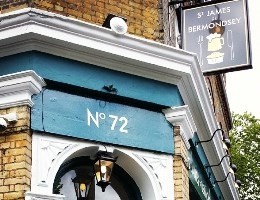Enterprise's two-fingered salute to its opponents

But we already know enough from its first directly-run outlet, St James’ of Bermondsey, south-east London, to suggest the company is serious about developing an estate of well-invested and properly promoted managed pubs in the capital and beyond.
Enterprise Inns has plenty of “gold bricks” among its 5,000-plus pubs and, to some extent, could be spoilt for choice when it comes to selecting those sites it wishes to take lucratively into company control. But one imagines it will start with those with great potential, but which it has struggled either to make work under the leased and tenanted (L&T) model, or to sell at or above book value.
Powerful message
So there are good business reasons for Enterprise to take tentative steps into managed pubs — despite the significant cost and management time, attention and learning required. But one can’t help thinking that there is also a powerful political message being deployed here by Enterprise.
Last year, when he first mooted the idea of developing a managed estate, chief executive (then in-waiting) Simon Townsend said: “Our core offering will remain the L&T model… but it is important that we understand how other formats could assist our ability to optimise our income…
“We will examine current and anticipated market and consumer trends and consider regulatory influences. The outcome may require us to develop an operational infrastructure capable of supporting such models. Of course, were we to develop a capability to support a managed format for the lower end of our estate, this could represent an opportunity to explore how we might use such a capability to optimise our income from other assets within the estate.”
Strategy
It is sensible for any business to conduct regular PESTLE analyses to identify any emerging political, economic, societal, technological, legal or environmental influences on its operations, and then adapt its strategy to mitigate any potentially negative implications that may arise.
It appears that Enterprise has paid particular attention to the ‘P’ and concluded that it is operating exclusively in an unacceptably risky environment characterised by (at least two-party) political opposition to its business model.
By putting its toe in the water of managed pub operations, it is emitting a clear signal that it is willing and able to switch — partially at least — out of an area of business that is attracting such intense and time-consuming scrutiny. The message is, essentially: “If politicians and campaigners don’t think there is enough upside in our pubs for tenants, we’ll run them ourselves and take all of the risk and reward.”
And just to round off this two-fingered salute to its opponents — who think of Enterprise as a property company in pubco clothing — it has been busy promoting its first managed pub on Twitter using the hashtag #notanotherblockofflats
Enterprise might have a new boss, but it’s lost none of its fight!






